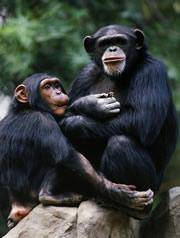 Chimps may be the most patient of primates — including humans.Alamy
Chimps may be the most patient of primates — including humans.AlamyChimps struggling to accumulate a large quantity of food deliberately keep themselves busy to avoid the temptation to gorge themselves straight away, researchers have found. The study shows that, like a shopaholic striving to resist the lure of the department store, our ape cousins welcome a distraction that takes the mind off the impulsive urge to splash out.
Researchers at Georgia State University in Atlanta presented four chimps with a plastic container attached to a tube that gradually filled the container with candy. Opening it, however, would cut off the flow of food. Chimps were kept away from the candy machine but were allowed to observe it, so learning that the longer they waited, the bigger the treat they would get.
But as many of us know, self-control doesn't come easily. Studies of human children have shown that the average five-year-old is rarely able to resist eating sweets, even if promised that abstinence will be rewarded with even more sweets later on.
The Georgia researchers, Theodore Evans and Michael Beran, guessed that chimps would have a good chance at resisting the candies if given a range of toys and other distractions to play with. "We chose a set of items they are known to have an interest in," explains Evans. "They enjoy brushing their teeth, for example; we gave them magazines so they could look at the pictures; and they enjoy different types of fasteners, zips and clips that they can take apart."
The chimps resisted going for the accumulating candies for longer when given access to the toys, showing that play did indeed take their minds off food.
And they were more likely to play with the toys when the candies were accessible than when they were visible but behind a barrier. This suggests that they actively chose to use the toys as a distraction, rather than simply playing for the fun of it. The results are presented in the journal Biology Letters1.
Easily distracted
"I was a little bit surprised," says Evans. He says he expected the playthings to act as a distraction, but he didn't think that the chimps would deliberately use them for that purpose.
Like humans, however, such wisdom tends to come with age. The elder two chimps of the group — Lana, a 36-year-old female, and Sherman, a male aged 33 — managed to resist the sweet treats for longer on average: up to some 18 minutes. The younger chimps — 21-year-old female Panzee, and Mercury, a male a year younger than that - did less well, sometimes waiting only 30 seconds before leaping in.
That's still impressive compared with other species previously studied in similar tests, says Evans. Pigeons and rats, and even some monkeys, can only be persuaded of the benefits of frugality for several seconds before giving in to their cravings for food.
ADVERTISEMENT
Controlling their impulses could benefit chimps in the wild when deciding where and when to look for the best food, Evans adds. "Self-control may relate back to their feeding ecology — should they eat this food here now, or should they travel down the road and potentially find some nice fruit?" he explains.
Chimps low down in the troop social hierarchy often have to wait their turn for the best fruit, says Brian Hare from the Max Planck Institute for Evolutionary Anthropology in Leipzig, Germany. Perhaps self-distraction helps them pass the time, he says. In his own, as yet unpublished research, Hare has found that chimps are the most patient of the primates he has studied — including humans.
Visit our practiseself_control.html">newsblog to read and post comments about this story.
